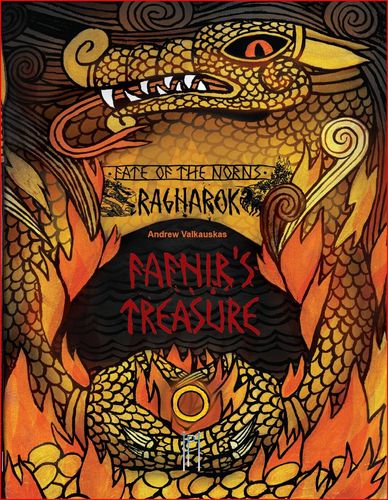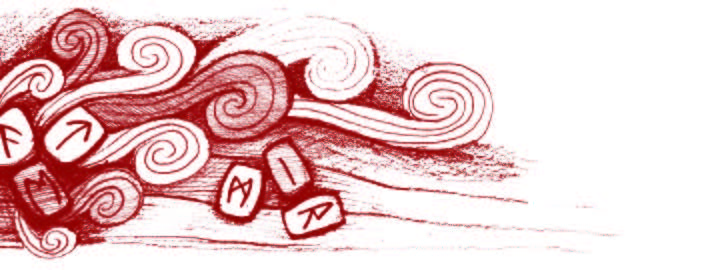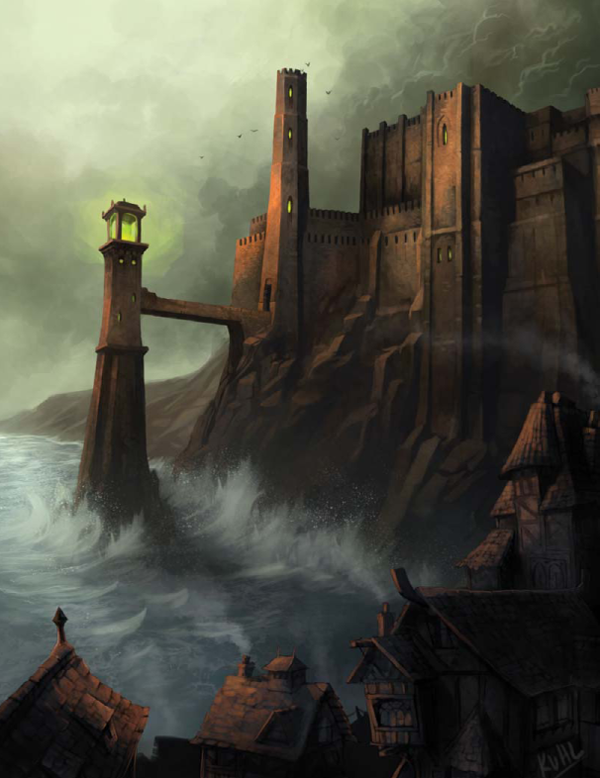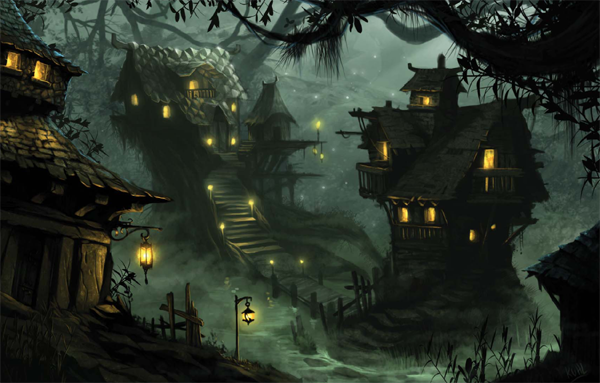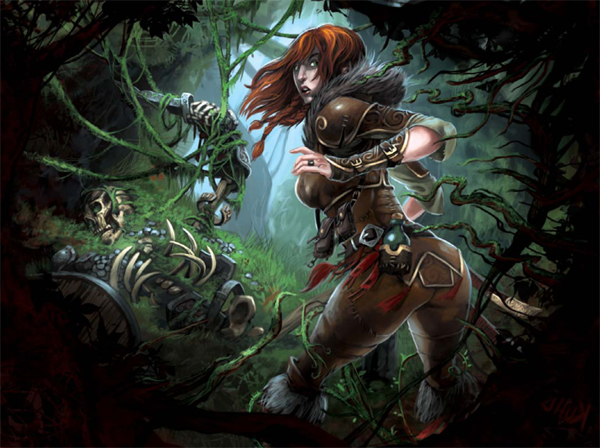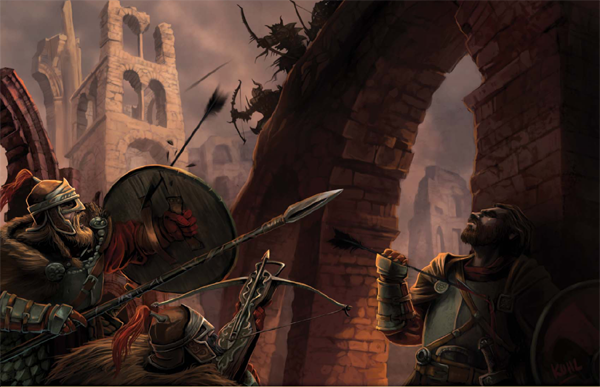
ALAS VEGAS (Niki Hunter)
ALAS VEGAS: an RPG of bad memories, bad luck & bad blood is a new roleplaying game by James Wallis currently on Kickstarter.
He created popular games like Once Upon a Time or The Extraordinary Adventures of Baron Munchausen. He also licensed and republished the classic Warhammer RPG originally by Games Workshop.
Every now and then I stumble over his works. For me his games are thought provoking. They teach me another perspective on the gaming hobby.
I am one of the critics of Games Workshop. James Wallis was apparently one of their satisfied business partners. The latest „Space Marine“-trademark story is in my opinion just one incident in a long story. His statement makes my general attitude clear that there is always an alternative view point.
In this interview, James Wallis promotes his suspenseful new game ALAS VEGAS and shares his interesting market insights.
obskures.de: Hello James Wallis, please tell us about your yourself and your gaming experiences.
 James Wallis: Hello! I’m best known as a game designer and RPG publisher—I brought Warhammer FRP back from the dead in the 1990s with my company Hogshead, proving that an European RPG publisher could take on the American market and succeed. I’ve been playing hobby-games since I was a teenager at boarding-school, but I moved quickly from playing games to writing and publishing material about them: first of all with fanzines (it was the 1980s), and then articles and reviews in games magazines, then designing games for US publishers, and then with my own company. These days I run a games-consultancy called Spaaace.
James Wallis: Hello! I’m best known as a game designer and RPG publisher—I brought Warhammer FRP back from the dead in the 1990s with my company Hogshead, proving that an European RPG publisher could take on the American market and succeed. I’ve been playing hobby-games since I was a teenager at boarding-school, but I moved quickly from playing games to writing and publishing material about them: first of all with fanzines (it was the 1980s), and then articles and reviews in games magazines, then designing games for US publishers, and then with my own company. These days I run a games-consultancy called Spaaace.
obskures.de: You created Once Upon a Time, a story-telling card game, and The
Extraordinary Adventures of Baron Munchausen, a story-telling roleplaying game. Your
new game ALAS VEGAS follows also this narration tradition? Tell us a bit more about the
RPG of bad memories, bad luck and bad blood.
 James Wallis: Alas Vegas is half-way between a story-game and a traditional RPG: it
James Wallis: Alas Vegas is half-way between a story-game and a traditional RPG: it
has a GM, character generation, a scenario and all that, but large amounts of the story
are created by the players themselves, without reference to the GM or the pre-written
adventure. It’s a really interesting blending of the two forms, I think. And it uses tarot cards
as a way of creating narrative out of the game mechanics, so it’s a cousin to Once Upon
a Time too. Though in this case they’re telling stories of classic Las Vegas, or somewhere
that looks a lot like it.
obskures.de: „The player-characters begin the game by digging themselves out of a
shallow grave in the desert, at midnight. They are naked, and they have no memory of
who they are or how they got where they are. On the horizon is a scar of neon. There will
be answers there. And trouble.“
I don’t think there will be prescribed adventure. Does ALAS VEGAS include a story/plot
toolbox or how is the narration driven?
 James Wallis: There is a pre-written adventure, or at least a narrative structure. One of
James Wallis: There is a pre-written adventure, or at least a narrative structure. One of
the things I wanted to do with ALAS VEGAS was to create an RPG with a clear end, like a
TV miniseries or a good book. This lets the adventure writer and the GM work together to
create a properly structured story with emotional beats, like a good screenplay. The game
will play out over four sessions: that means I can make sure that each session ends with
a cliffhanger. I don’t think I’ve ever played an RPG that let you do that before, and yet it’s
such a simple and obvious idea.
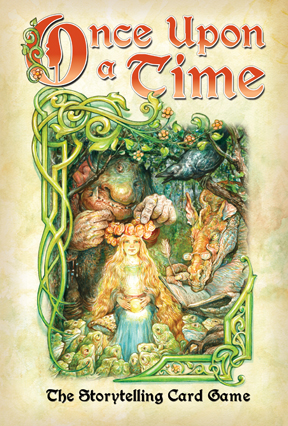
Once Upon A Time (Atlas Games)
obskures.de: Can you tell us a bit more about the Fugue system. What about the Tarot?
Does it work with a classic task or a scene resolution system?
 James Wallis: The Fugue system is my name for the mechanic that drives Alas Vegas,
James Wallis: The Fugue system is my name for the mechanic that drives Alas Vegas,
and will drive two, maybe three other games too—we’re coming to the close of the
Kickstarter appeal for funding right now so I don’t know how much additional content
will be in the book yet. It’s a rules-light system designed for any narrative where the player-characters start the game with amnesia and recover their memories as part of the gameplay. So when your PC needs a certain skill, you simply say “I have a flashback to my old life,” and describe a memory of using the skill you need. But these are characters in an RPG, so the skills they’re likely to need are probably going to be violent ones, so the
memories they unlock are also going to be violent and unpleasant. And there’s a mechanic for having the different PCs’ memories overlap and interweave, so that as the characters remember who they were, they start to create the story of what they did together—and they start to work out what happened to put them in a shallow grave in the Nevada desert.
The task-resolution system uses tarot cards instead of dice, because that lets me use the
cards as a narrative generator as well as a random-number generator, and create wild-
card situations as well. Every PC has a Signifier, one tarot card that means a lot to them.
If it comes up in play—and statistically it should do about once a session—then things get
weird for that character for a moment.
obskures.de: What do you think is the best part and what is the most critical part of ALAS VEGAS?
 James Wallis: I don’t think that’s for me to say, really. I think I’ve created an interesting mix of mechanics, and a game that I personally would love to play, but right now I really don’t know whether other people will feel the same way about it. I do think the recovered- memories mechanic is beautifully simple—I think simplicity and elegance is really
James Wallis: I don’t think that’s for me to say, really. I think I’ve created an interesting mix of mechanics, and a game that I personally would love to play, but right now I really don’t know whether other people will feel the same way about it. I do think the recovered- memories mechanic is beautifully simple—I think simplicity and elegance is really
important in game-mechanics—and I hope that it works as a narrative device in the wild world as it has done in playtest.
obskures.de: Spaaace is your own games consultancy. What do you do as an games consultant and who are your clients? Please give us some insights.
 James Wallis: As a game consultant I get a lot of very diverse work. Recently I’ve been critiquing a large educational game for an American company, working on a CCG design for a non-profit, I designed a Facebook social-game for a massive pharmaceutical company, and just last week I was contacted by an environmental charity to create a crisis simulation exercise for them. I also talk to agencies about why games are important, how they work to engage people and how to use them as a part of advertising or marketing campaigns, or just to give customers a better experience. I’ve worked with Sony and Hasbro, I’ve advised start-up companies on how set up and organise their businesses, and I lecture to students at several universities and appraise their coursework.
James Wallis: As a game consultant I get a lot of very diverse work. Recently I’ve been critiquing a large educational game for an American company, working on a CCG design for a non-profit, I designed a Facebook social-game for a massive pharmaceutical company, and just last week I was contacted by an environmental charity to create a crisis simulation exercise for them. I also talk to agencies about why games are important, how they work to engage people and how to use them as a part of advertising or marketing campaigns, or just to give customers a better experience. I’ve worked with Sony and Hasbro, I’ve advised start-up companies on how set up and organise their businesses, and I lecture to students at several universities and appraise their coursework.
I suspect that most of the rest of my year will be spent telling people how to run successful fundraising projects on Kickstarter.
It’s fun.
obskures.de: Kickstarter (Crowdfunding) became within a very short time the FORCE within the whole scene. Electronic devices and tools are marching forward to the gaming table. Affordable 3D printer may hurt or even kill the miniature industry. The majority of tabletop players is growing older and older? Modern technology and distribution channels allows everybody to be a publisher. The hobby community and market is changing, rapidly. How do you perceive these landslide-like changes?
 James Wallis: Everything is changing. Everything. We talk about the effect that 3D printing is going to have on the minis business, but 3D printing is going to change the world in the same way that affordable computers did thirty years ago. Kickstarter is disrupting the traditional system of distribution and retail in the games industry but in a positive way, not a negative one: it’s already given gifted creators the chance to make successful games, and shown retailers that these are games that will sell for them.
James Wallis: Everything is changing. Everything. We talk about the effect that 3D printing is going to have on the minis business, but 3D printing is going to change the world in the same way that affordable computers did thirty years ago. Kickstarter is disrupting the traditional system of distribution and retail in the games industry but in a positive way, not a negative one: it’s already given gifted creators the chance to make successful games, and shown retailers that these are games that will sell for them.
Ten years ago I was very doom-and-gloom about the RPG industry—not the tabletop industry, that was clearly getting stronger and stronger—but traditional RPGs. I think Kickstarter has given that a new lease of life.
I’m an optimist. I think that technology is generally making things better for everyone.
The future is somewhere I want to live… if we can avoid destroying the ecosystem of our planet, of course.
obskures.de: I think you heard about the Games Workshop „Space Marine“-Trademark incident. At Hogshead Publishing you worked with this company. If I recall correctly, the complicated collaboration with GW about the Warhammer Roleplay was one coffin nail for your Hogshead Publishing. Do you have an opinion on the market positioning of this games publisher from Nottingham?
 James Wallis: Hogshead had a nine-year professional relationship with Games Workshop.
James Wallis: Hogshead had a nine-year professional relationship with Games Workshop.
When we signed the deal a lot of companies thought we’d signed our own death-warrant. Actually it was Warhammer FRP that made Hogshead a success, and all our dealings with Games Workshop were easy and straightforward. After I sold Hogshead I then wrote two novels and a lot of short stories for the company’s fiction division as well—I wouldn’t have done that if things had gone badly between GW and Hogshead.
GW is a huge company, and sometimes it takes a while for a question to get answered or a project to get approved. But I’ve worked with a lot of games companies in the last thirty years, and GW is very high on the list of the ones I would happily work with again, if the right project came along.
As for the ‘space marine’ mess, big companies have to defend their trademarks or the trademarks enter the public domain—that’s how trademark law works. The problem wasn’t that the author had written about space marines in her book, the problem was she’d used the phrase ‘space marine’ in the title of the book. I’m absolutely sure if she’d been prepared to change it to ‘star marine’ or had included a couple of lines acknowledging that GW has a trademark on the term, that would have been absolutely fine. Instead she ran shrieking to the internet and got an enormous amount of publicity for a book that, from what I’ve read of it, is not very good.
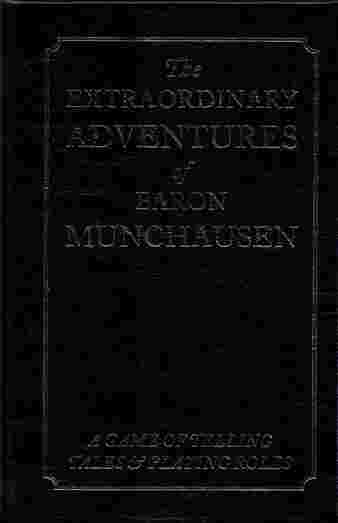
The Extraordinary Adventures of Baron Munchausen (James Wallis)
obskures.de: Please share your favorite ALAS VEGAS or Baron Munchhausen anecdote or story.
 James Wallis: The Baron Munchausen game is an interesting story. The core of the game is half a page of rules, but it’s difficult to sell a game that short, so it’s wrapped up in a much larger book, which is Baron Munchausen trying to explain the rules to his own game, and constantly getting distracted or branching off to tell extraordinary stories. The backstory to the game is that my ancestors John and Edward Wallis who were games publishers around 1780-1820 (this is true) met Baron Munchausen and commissioned him to make them a game, he created the first RPG, and they realised the games market two centuries ago wasn’t ready for such a thing and placed it among my family papers, where I found it in 1998 and published it. (This is not so true.) Two or three years ago I received an email from a graduate student, saying he was writing his PhD thesis on games publishers of the late eighteenth century and he was having problems finding any first-hand records, but he understood that I had access to the family papers of John and Edward Wallis. I had to write back to him, saying, “Dude, did you read
James Wallis: The Baron Munchausen game is an interesting story. The core of the game is half a page of rules, but it’s difficult to sell a game that short, so it’s wrapped up in a much larger book, which is Baron Munchausen trying to explain the rules to his own game, and constantly getting distracted or branching off to tell extraordinary stories. The backstory to the game is that my ancestors John and Edward Wallis who were games publishers around 1780-1820 (this is true) met Baron Munchausen and commissioned him to make them a game, he created the first RPG, and they realised the games market two centuries ago wasn’t ready for such a thing and placed it among my family papers, where I found it in 1998 and published it. (This is not so true.) Two or three years ago I received an email from a graduate student, saying he was writing his PhD thesis on games publishers of the late eighteenth century and he was having problems finding any first-hand records, but he understood that I had access to the family papers of John and Edward Wallis. I had to write back to him, saying, “Dude, did you read
the game? It’s about making up larger-than-life stories. It’s about lying convincingly.” I never heard back from him.
obskures.de: What do you plan next after the ALAS VEGAS Kickstarter?
 James Wallis: A lot of people have asked if we can create a tarot deck to go alongside
James Wallis: A lot of people have asked if we can create a tarot deck to go alongside
Alas Vegas, so we’re going to see if we can raise enough money to publish that. The Alas Vegas rulebook will contain the artwork for 22 cards from the major arcana of the tarot by the award-winning artist John Coulthart, which is a pretty good start. Beyond that—I’m not
sure. I have some games in prototype, and I’m quite excited about one of them. But I’m not saying more at this stage.
obskures.de: Finally, some fun and quick questions. We start with: Role playing is …
 James Wallis: The reason I survived to adulthood.
James Wallis: The reason I survived to adulthood.
obskures.de: Where do you find your major inspirations or design priniciples for your
games?
 James Wallis: I play games. Lots of them. My games collection isn’t a library, it’s a toolkit.
James Wallis: I play games. Lots of them. My games collection isn’t a library, it’s a toolkit.
Also I have a theory, given the fact I had ancestors who were also games designers and publishers, that it may be genetic.
obskures.de: You prefer Gamemaster or player?
 James Wallis: It depends on the game. I really like story-games, where there is no GM, just players working together to create the story.
James Wallis: It depends on the game. I really like story-games, where there is no GM, just players working together to create the story.
obskures.de: What are the key ingredients for a great game?
 James Wallis: I think if a game can make you laugh as you’re playing it, even if it’s not a funny game, then that’s the sign that it really works. I don’t trust games that don’t make the players laugh. It’s one of the reasons I never paid much attention to chess.
James Wallis: I think if a game can make you laugh as you’re playing it, even if it’s not a funny game, then that’s the sign that it really works. I don’t trust games that don’t make the players laugh. It’s one of the reasons I never paid much attention to chess.
obskures.de: A design tip for established or upcoming game developers?
 James Wallis: Simplify. If you have a rule that isn’t working properly, never introduce a new rule on top to make it work. Try the game without the bad rule instead.
James Wallis: Simplify. If you have a rule that isn’t working properly, never introduce a new rule on top to make it work. Try the game without the bad rule instead.
obskures.de: What is your favorite role playing game of all time and in recent years?
 James Wallis: Of all time? I’m still very fond of Munchausen, of course, but the game that’s given me the best memories is Empire of the Petal Throne, the second RPG ever published. The mechanics are horrible but the world is incredibly vivid, a real living society, and it has a permanence in my memory that no other RPG I’ve ever played has. In recent
James Wallis: Of all time? I’m still very fond of Munchausen, of course, but the game that’s given me the best memories is Empire of the Petal Throne, the second RPG ever published. The mechanics are horrible but the world is incredibly vivid, a real living society, and it has a permanence in my memory that no other RPG I’ve ever played has. In recent
years Robin Laws’s Hillfolk game is the most exciting thing I’ve played recently—I love Fiasco but Hillfolk and the Drama System rules-set is sweeter and more versatile in my opinion.
obskures.de: What is your favorite video, board game of all time and in recent years?
 James Wallis: I’ve probably played more Settlers of Catan than any other board-game ever. I love its elegance, and I love how well it turns non-players into board-gamers.
James Wallis: I’ve probably played more Settlers of Catan than any other board-game ever. I love its elegance, and I love how well it turns non-players into board-gamers.
obskures.de: Favorite game designer and/or artist?
 James Wallis: Too many to name. Designers in RPGs, Greg Costikyan, Sandy Petersen, the late Lynn Willis, Robin D. Laws, Ken Hite, the late but immortal M A R Barker who created Empire of the Petal Throne, Jason Morningstar… In board-games Sid Sackson, Reiner Knizia, Bruno Faidutti, Matt Leacock. In computer games… too many to name.
James Wallis: Too many to name. Designers in RPGs, Greg Costikyan, Sandy Petersen, the late Lynn Willis, Robin D. Laws, Ken Hite, the late but immortal M A R Barker who created Empire of the Petal Throne, Jason Morningstar… In board-games Sid Sackson, Reiner Knizia, Bruno Faidutti, Matt Leacock. In computer games… too many to name.
obskures.de: I get the best ideas for my games when … or I am most creative when … ?
 James Wallis: In the shower or taking long walks. Or in a boring concert, play or film.
James Wallis: In the shower or taking long walks. Or in a boring concert, play or film.
Anywhere that lets the mind wander, and start to pull disassociated topics and ideas together. The Baron Munchausen game came to me in the shower. I’d spent two years trying to create a traditional RPG about the Baron’s adventures and the design had never worked. And then I was washing my hair, thinking ‘Of course the RPG doesn’t work because the Baron doesn’t experience his stories, he narrates them, so really it should be a game about telling stories of your adventures—‘ and BANG BANG BANG when I switched the water off two minutes later I had the whole game, the same set of rules that’s in that half-page at the heart of the game today.
That doesn’t happen very often, but when it does it’s the best feeling in the world. I was high for a week after that.
obskures.de: Thank you, James Wallis. Anything else you want to share with the fans?
 James Wallis: Check out the playtest rules for Alas Vegas—anyone who backs the Kickstarter for the game at any level can download a copy, and to be honest I don’t mind if you share copies around. I would be really interested to hear feedback. I thought the whole idea of a close-format four-episode game was something new to the RPG scene but it turns out it’s a whole sub-genre of RPG in France—that’s where the ‘blast’ name comes from. If Alas Vegas overlaps with something that’s already been published, I’d like to know about it.
James Wallis: Check out the playtest rules for Alas Vegas—anyone who backs the Kickstarter for the game at any level can download a copy, and to be honest I don’t mind if you share copies around. I would be really interested to hear feedback. I thought the whole idea of a close-format four-episode game was something new to the RPG scene but it turns out it’s a whole sub-genre of RPG in France—that’s where the ‘blast’ name comes from. If Alas Vegas overlaps with something that’s already been published, I’d like to know about it.
You can learn more about James Wallis and his games consultancy on the Spaaace website. Only a few hours left to support the Kickstarter for Alas Vegas. I am a backer!
Images: Niki Hunter, James Wallis and Atlas Games




